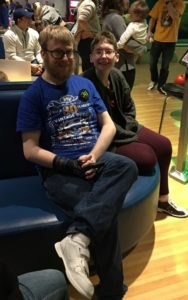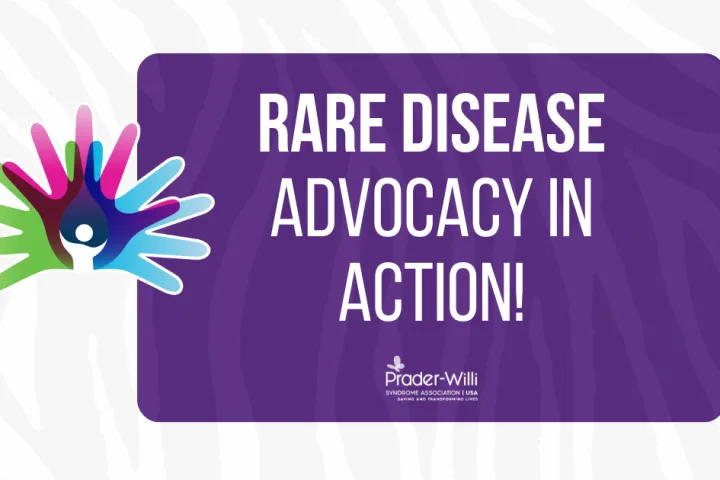Living and Thriving with PWS – The Transition to College
By Derek Montecalvo
The transition to college was stressful. When I moved onto campus, I avoided added stress by using the campus dining hall, and I would shop weekly with my mom to buy groceries to store in my room inside of a mini-fridge and on mini-pantry. The year started out great, but closer to the summer, I was struggling with coursework and dorm-life. I had student accommodations that most of my professors had trouble honoring due to a non-verbal learning disability. Because of that and harassment from other students in my dorm, I exhibited a much higher food drive by eating the weekly food before the end of the week, and using a debit-card to retrieve money to use for vending-machines. I would also use the city bus to travel to the mall and buy food from the food court. My weight skyrocketed – it was more like the freshman 60 instead of the freshman 15. I went from a steady weight of about 160 lbs to a heavier weight of 220 lb.
I ended up withdrawing due to health reasons and went back home. I continued my education in a community college setting. Due to stress associated with squabbles with my parents, my food-seeking behaviors was at an all-time high. I was using money from book buybacks to purchase lunch at the dining hall and to order delivery from local fast food places. I withdrew from the community college and was admitted to multiple in-patient psych visits due to my heightened anxiety and depression over food-seeking. I had reached the point where I was having suicidal ideations, so I was granted services to go into a residential housing facility.
Because I was considered high functioning, I had my own apartment with a roommate and the food was not secure. My roommate also had access to his debit card and food stamps. I would steal them for myself to procure food from either the local food mart or the local pizza shop on the corner. This program wasn’t really built for an individual with PWS and didn’t consider purchasing healthy foods from reputable sources to help manage food-seeking behaviors and weight gained associated with PWS. After training from Latham Centers, I was put on a weekly menu system which is when I started to boycott again. I stole my money from my financial book to continue to procure food from the food mart, but I also started ordering delivery from an area pizza shop. One night I had a nasty binge where I ended up eating a bunch of food in one sitting that landed me in a 2-week hospital stay due to food-poisoning and bloating. Thankfully, there was no evidence of necrosis.
It was then that I realized I had a major food-drive among behavioral issues that needed to all be addressed. My parents brought my case to the state upon receiving legal co-guardianship of me to help me be admitted to Latham Centers Adult Program. After a six month battle of the state denying me the funding, I was admitted to the Adult program in July of 2012 and started on a restricted diet of 1600 calories a day and eating foods based off of the ADA diabetic diet. I was moved into a lovely house in Barnstable on Cape Cod. I couldn’t get day services right away, but I was able to get daily exercise by walking to the town beach for a swim or using the community tricycle on a private dirt road near the house. Entering Latham, I weighed in at a whopping 285 lbs. It was the heaviest I have ever been. Over the course of a couple years, I was able to maintain an exercise routine with my day program and with my housemates. I dropped a considerable amount of weight. Amazingly, I went down to 160 lbs. It was during this time that I met my lovely girlfriend, who also has PWS.
Join us next week for Living and Thriving with PWS – Love, Faith, and Future Grace

About the author: Derek Montecalvo is a college student with Prader-Willi syndrome (PWS). Derek has authored a series of blog posts about his journey with PWS and hopes to be a beacon of hope for others that love someone with PWS. Derek is proud of his stripes and no longer afraid of his rare disease and continues to not just live his life – but thrive – with PWS.





 Perry A. Zirkel has written more than 1,500 publications on various aspects of school law, with an emphasis on legal issues in special education. He writes a regular column for NAESP’s Principal magazine and NASP’s Communiqué newsletter, and he did so previously for Phi Delta Kappan and Teaching Exceptional Children.
Perry A. Zirkel has written more than 1,500 publications on various aspects of school law, with an emphasis on legal issues in special education. He writes a regular column for NAESP’s Principal magazine and NASP’s Communiqué newsletter, and he did so previously for Phi Delta Kappan and Teaching Exceptional Children. Jennifer Bolander has been serving as a Special Education Specialist for PWSA (USA) since October of 2015. She is a graduate of John Carroll University and lives in Ohio with her husband Brad and daughters Kate (17), and Sophia (13) who was born with PWS.
Jennifer Bolander has been serving as a Special Education Specialist for PWSA (USA) since October of 2015. She is a graduate of John Carroll University and lives in Ohio with her husband Brad and daughters Kate (17), and Sophia (13) who was born with PWS. Dr. Amy McTighe is the PWS Program Manager and Inpatient Teacher at the Center for Prader-Willi Syndrome at the Children’s Institute of Pittsburgh. She graduated from Duquesne University receiving her Bachelor’s and Master’s degree in Education with a focus on elementary education, special education, and language arts.
Dr. Amy McTighe is the PWS Program Manager and Inpatient Teacher at the Center for Prader-Willi Syndrome at the Children’s Institute of Pittsburgh. She graduated from Duquesne University receiving her Bachelor’s and Master’s degree in Education with a focus on elementary education, special education, and language arts. Evan has worked with the Prader-Willi Syndrome Association (USA) since 2007 primarily as a Crisis Intervention and Family Support Counselor. Evans works with parents and schools to foster strong collaborative relationships and appropriate educational environments for students with PWS.
Evan has worked with the Prader-Willi Syndrome Association (USA) since 2007 primarily as a Crisis Intervention and Family Support Counselor. Evans works with parents and schools to foster strong collaborative relationships and appropriate educational environments for students with PWS. Staci Zimmerman works for Prader-Willi Syndrome Association of Colorado as an Individualized Education Program (IEP) consultant. Staci collaborates with the PWS multi-disciplinary clinic at the Children’s Hospital in Denver supporting families and school districts around the United States with their child’s Individual Educational Plan.
Staci Zimmerman works for Prader-Willi Syndrome Association of Colorado as an Individualized Education Program (IEP) consultant. Staci collaborates with the PWS multi-disciplinary clinic at the Children’s Hospital in Denver supporting families and school districts around the United States with their child’s Individual Educational Plan. Founded in 2001, SDLC is a non-profit legal services organization dedicated to protecting and advancing the legal rights of people with disabilities throughout the South. It partners with the Southern Poverty Law Center, Protection and Advocacy (P&A) programs, Legal Services Corporations (LSC) and disability organizations on major, systemic disability rights issues involving the Individuals with Disabilities Education Act (IDEA), Americans with Disabilities Act (ADA), and the federal Medicaid Act. Recently in November 2014, Jim retired.
Founded in 2001, SDLC is a non-profit legal services organization dedicated to protecting and advancing the legal rights of people with disabilities throughout the South. It partners with the Southern Poverty Law Center, Protection and Advocacy (P&A) programs, Legal Services Corporations (LSC) and disability organizations on major, systemic disability rights issues involving the Individuals with Disabilities Education Act (IDEA), Americans with Disabilities Act (ADA), and the federal Medicaid Act. Recently in November 2014, Jim retired.